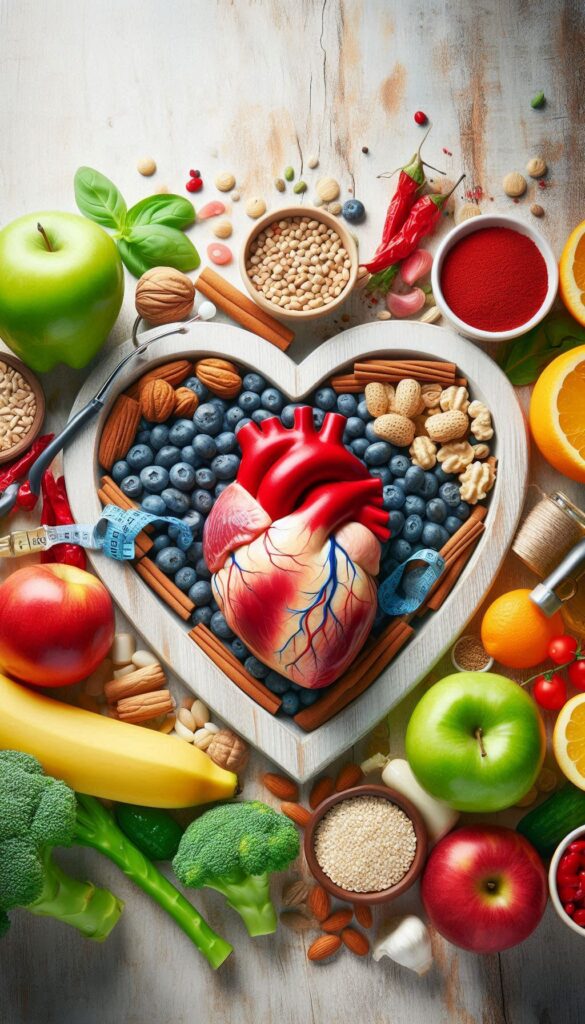Maintaining a heart-healthy diet is crucial for overall well-being, especially for women. Heart disease remains a leading cause of death among women, making it vital to adopt dietary habits that support cardiovascular health. This comprehensive guide will explore a variety of heart-healthy foods to incorporate into your diet, offering practical tips and delicious ideas to help you make nutritious choices that benefit your heart.

Understanding the Importance of Heart-Healthy Eating
Heart-healthy eating involves choosing foods that promote cardiovascular health by reducing the risk of heart disease and other related conditions. These foods are typically rich in nutrients, fiber, and healthy fats, while being low in saturated fats, trans fats, cholesterol, and sodium. Incorporating heart-healthy foods into your daily diet can help manage weight, lower blood pressure, reduce cholesterol levels, and improve overall heart function.
Top Heart-Healthy Foods to Incorporate into Your Diet
1. Fatty Fish
Fatty fish, such as salmon, mackerel, sardines, and trout, are excellent sources of omega-3 fatty acids. These healthy fats help reduce inflammation, lower blood pressure, and decrease the risk of arrhythmias. Aim to include fatty fish in your diet at least twice a week.
Tip: Grill or bake fish with a drizzle of olive oil, lemon juice, and fresh herbs for a simple, heart-healthy meal.
See price for Oster Air Fryer Oven, 10-in-1 Countertop Toaster, Large Enough for 2 Pizzas, Stainless Steel French Doors, XL Sized https://amzn.to/4bxhPhu
2. Berries
Berries, including strawberries, blueberries, raspberries, and blackberries, are packed with antioxidants, vitamins, and fiber. These nutrients help reduce oxidative stress and inflammation, which are linked to heart disease. Berries also help improve cholesterol levels and lower blood pressure.
Tip: Add berries to your morning yogurt, oatmeal, or smoothie for a burst of flavor and nutrition.
3. Leafy Green Vegetables
Leafy green vegetables like spinach, kale, and Swiss chard are rich in vitamins, minerals, and antioxidants. They are particularly high in vitamin K, which helps protect arteries and promote proper blood clotting. The nitrates in leafy greens also help lower blood pressure.
Tip: Incorporate leafy greens into salads, soups, and stir-fries, or blend them into smoothies for a nutrient boost.
Whole grains, such as oats, brown rice, quinoa, and whole wheat, are excellent sources of fiber, which helps lower cholesterol levels and reduce the risk of heart disease. Whole grains also provide essential nutrients like B vitamins, iron, and magnesium.
Tip: Replace refined grains with whole grains in your meals. Opt for whole-grain bread, pasta, and cereals to increase your fiber intake.
See price for DeLallo Pasta Gluten-Free Corn and Rice Orzo, 12 oz https://amzn.to/4cvHjNH
5. Nuts and Seeds
Nuts and seeds, including almonds, walnuts, flaxseeds, and chia seeds, are rich in healthy fats, protein, fiber, and antioxidants. These nutrients help reduce inflammation, lower cholesterol, and improve heart health. However, they are calorie-dense, so it’s essential to consume them in moderation.
Tip: Snack on a handful of nuts, sprinkle seeds over your salads, or add them to your yogurt and smoothies for a nutritious crunch.
See price for Cascadian Farm Organic Gluten Free Brownie Crunch Cereal, 12.4 oz. https://amzn.to/3Wc7lQv
6. Avocados
Avocados are a great source of monounsaturated fats, which help lower bad cholesterol levels and reduce the risk of heart disease. They also provide potassium, a mineral that helps regulate blood pressure.
Tip: Use avocados as a spread on toast, add them to salads and sandwiches, or blend them into smoothies for a creamy texture.
Olive oil, especially extra virgin olive oil, is rich in monounsaturated fats and antioxidants. It helps reduce inflammation, lower blood pressure, and improve cholesterol levels, all of which contribute to better heart health.
Tip: Use olive oil as your primary cooking oil and drizzle it over salads, vegetables, and whole-grain dishes.
8. Legumes
Legumes, such as beans, lentils, and chickpeas, are high in fiber, protein, and various vitamins and minerals. They help lower cholesterol levels, regulate blood sugar, and reduce the risk of heart disease.
Tip: Incorporate legumes into soups, stews, salads, and side dishes to increase your intake of heart-healthy nutrients.
9. Tomatoes
Tomatoes are rich in lycopene, an antioxidant that helps reduce inflammation and oxidative stress. They also provide potassium and vitamin C, which are beneficial for heart health.
Tip: Add fresh tomatoes to salads, sandwiches, and salsas, or use tomato-based sauces in your cooking for a flavorful and nutritious boost.
Practical Tips for Incorporating Heart-Healthy Foods
Plan Your Meals
Planning your meals ahead of time can help you make healthier choices and avoid impulsive eating. Create a weekly meal plan that includes a variety of heart-healthy foods and stick to it.
Cook at Home
Cooking at home allows you to control the ingredients and portion sizes, making it easier to incorporate heart-healthy foods into your diet. Experiment with new recipes and cooking methods to keep your meals interesting and nutritious.
Be Mindful of Portions
While heart-healthy foods are nutritious, it’s important to be mindful of portion sizes to avoid overeating. Use smaller plates, measure your servings, and listen to your body’s hunger cues.
See price for Magic Bullet Blender, Small, Silver, 11 Piece Set https://amzn.to/3LdNVV1
Stay Hydrated
Drinking plenty of water throughout the day helps support overall health and can prevent overeating. Sometimes, thirst is mistaken for hunger, leading to unnecessary snacking.
Limit Processed Foods
Processed foods often contain high levels of added sugars, unhealthy fats, and sodium, which can negatively impact heart health. Focus on whole, unprocessed foods to maximize nutrient intake and support cardiovascular health.
Read Food Labels
Reading food labels can help you make informed choices and avoid hidden ingredients that may be harmful to your heart. Look for products with low sodium, no added sugars, and healthy fats.
See price for Breville Die-Cast Smart Toaster 2 Slice BTA820XL, Brushed Stainless Steel https://amzn.to/4cMlAko
Conclusion
Incorporating heart-healthy foods into your diet is a powerful way to support cardiovascular health and reduce the risk of heart disease. By making mindful choices and focusing on nutrient-dense foods, women can enjoy delicious meals that promote long-term well-being. Remember, it’s not about making drastic changes overnight but gradually adopting healthier eating habits that become a natural part of your lifestyle.
References
- American Heart Association. (2021). Healthy Eating. Retrieved from American Heart Association
- Harvard T.H. Chan School of Public Health. (2021). The Nutrition Source: Heart-Healthy Diet. Retrieved from Harvard Nutrition Source
- Mayo Clinic. (2021). Heart-Healthy Diet: 8 Steps to Prevent Heart Disease. Retrieved from Mayo Clinic
- National Institutes of Health (NIH). (2021). Heart-Healthy Eating. Retrieved from NIH Heart-Healthy Eating
- World Health Organization (WHO). (2021). Healthy Diet. Retrieved from WHO Healthy Diet
By incorporating these heart-healthy foods and tips into your daily routine, you can take significant steps towards improving your cardiovascular health and overall well-being.
